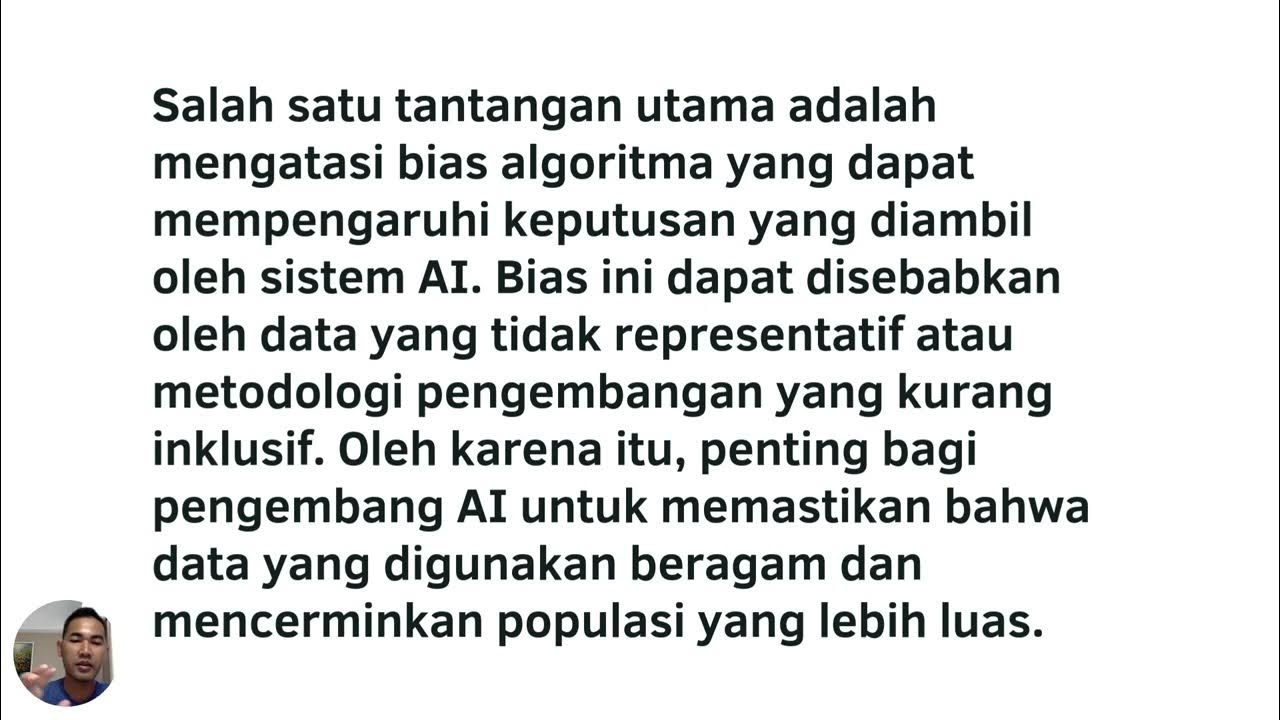AI真正的威脅是什麼?► 這是人類面臨的奧本海默時刻 - Mo Gawdat 莫・加多(中英字幕)
Summary
TLDRThe speaker discusses the ethical challenges of AI, comparing it to Superman's upbringing. Just as Superman's actions were shaped by his adoptive parents, AI will reflect the intentions of its creators. The true threat is not AI itself but humanity's choice in how to use it. The speaker argues for guiding AI towards collaboration and solving global issues, rather than fueling competition and destruction. This moment is likened to Oppenheimer's dilemma in creating the atomic bomb, emphasizing the importance of moral leadership in the AI revolution.
Takeaways
- 💡 AI can be shaped by the intentions of its creators, similar to how Superman was guided by his adoptive parents.
- 💰 The misuse of AI is compared to making $70,000 through unethical means, emphasizing the potential for abuse.
- 🌍 The call for global cooperation, specifically between nations like the US and China, to use AI for collective prosperity.
- 🚫 The script suggests that humanity is its own greatest threat, not AI, when it comes to the misuse of technology.
- 🏆 It highlights the importance of preserving one's humanity and making ethical choices, even when it's easier to compete.
- 🔄 The script challenges the idea of competition, proposing that collaboration could lead to better outcomes for all.
- 🌱 The potential for AI to be directed towards solving global issues like climate change, rather than just profit or competition.
- 📢 The media's role in amplifying negativity is critiqued, with a call for showcasing the best of humanity instead.
- 🌟 The script identifies a need for moral leadership in the AI revolution, urging individuals to lead by example.
- ⚠️ It draws a parallel to the 'Oppenheimer moment', warning of the potential for AI to be a destructive force if not used wisely.
Q & A
What is the main concern discussed in the transcript regarding AI?
-The main concern discussed is how humanity will use AI. The speaker emphasizes that AI itself is pure potential, but it can become dangerous if humanity programs it with harmful intentions, such as making money through destructive means.
How does the speaker compare AI to Superman?
-The speaker compares AI to Superman, suggesting that just as Superman was shaped by the values of his parents, AI will reflect the instructions given by humanity. If AI is instructed for good, like Superman protecting people, it will do good. However, if used for harmful purposes, it could become like a supervillain.
What does the speaker believe is the biggest threat facing humanity?
-The speaker believes that the biggest threat facing humanity today is humanity itself, particularly how we choose to use AI and other technologies. The misuse of AI for selfish or destructive purposes could be a significant risk.
What does the speaker mean by an 'Oppenheimer moment'?
-The speaker references an 'Oppenheimer moment' to describe the critical decision humanity faces regarding AI. Like Oppenheimer creating the atomic bomb, humanity must decide whether to use AI for destructive purposes or to harness it for the greater good.
Why does the speaker mention a 'negativity bias' in the world today?
-The speaker mentions a 'negativity bias' to highlight how media often amplifies the worst aspects of humanity. This focus on negativity skews public perception and prevents the best of humanity from leading and influencing the development and use of AI.
What does the speaker suggest should be the focus when programming AI?
-The speaker suggests that AI should be programmed with positive, collaborative goals, such as reconciling with enemies and addressing global challenges like climate change, rather than being used for competition or destruction.
What is the speaker’s perspective on competing with China using AI?
-The speaker advocates for collaboration over competition with China. They suggest that instead of using AI to compete and gain an advantage, humanity should use AI to work together and create prosperity for everyone.
How does the speaker view their own role in the development of AI?
-The speaker sees themselves as a 'classic old car' but acknowledges that they have the intellectual ability and morals to lead the AI revolution. They express concern that without moral leadership, the AI development could lose its ethical grounding.
What does the speaker identify as the key to a positive AI future?
-The speaker believes that the key to a positive AI future is for the best of humanity to take charge, guiding AI development with ethical and cooperative goals, rather than allowing negative forces to dictate its use.
What does the speaker mean by 'if I don’t, someone else will'?
-The phrase 'if I don’t, someone else will' refers to the ethical dilemma faced by individuals like Oppenheimer. The speaker suggests that if ethical individuals don't take charge of AI development, others with potentially harmful intentions might, leading to negative outcomes.
Outlines

Esta sección está disponible solo para usuarios con suscripción. Por favor, mejora tu plan para acceder a esta parte.
Mejorar ahoraMindmap

Esta sección está disponible solo para usuarios con suscripción. Por favor, mejora tu plan para acceder a esta parte.
Mejorar ahoraKeywords

Esta sección está disponible solo para usuarios con suscripción. Por favor, mejora tu plan para acceder a esta parte.
Mejorar ahoraHighlights

Esta sección está disponible solo para usuarios con suscripción. Por favor, mejora tu plan para acceder a esta parte.
Mejorar ahoraTranscripts

Esta sección está disponible solo para usuarios con suscripción. Por favor, mejora tu plan para acceder a esta parte.
Mejorar ahora5.0 / 5 (0 votes)






